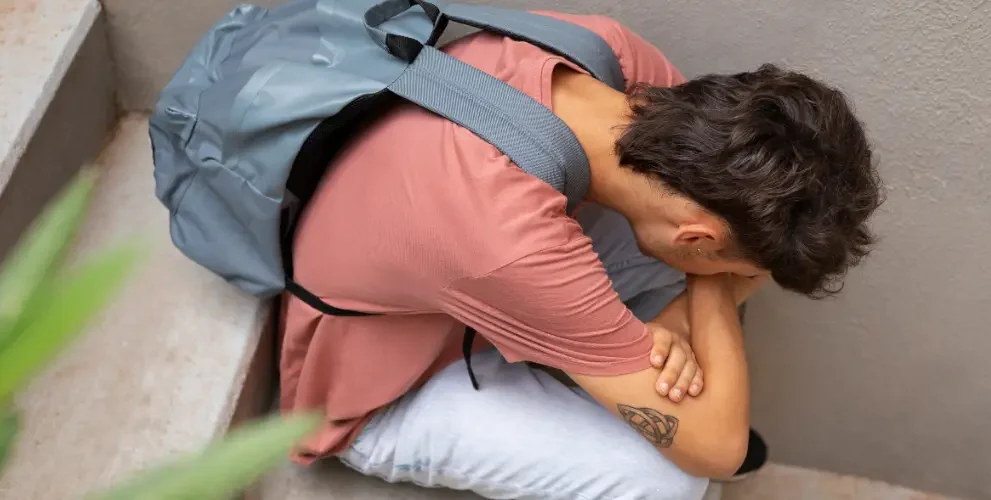Student suicides soar in India as exam pressure takes a deadly toll
Author
Author
- admin / 1 year

- 0
- 4 min read

Author
A Lancet study highlights the “enormous competition to gain admission into colleges and the media hype around the results,” as a contributing factor to student suicides.
The rising number of students who die by suicide in India have raised serious concerns about mental health and academic pressure- official records show that close to 20% of student suicides are directly linked to exam failure. A new study has outlined different factors that play a role in exam failure suicides- from low self-esteem and high expectations to over-ambitious parents and criticisms.
India has the highest suicide rate globally, and it has risen in recent times. The rate of suicides in India rose to 12.4 per 100,000 in 2022 from 9.9 in 2017, marking the highest rate ever recorded in the country, reveals a National Crime Records Bureau (NCRB) report released earlier this year. Students form a large part of those who die by suicide. The NCRB report highlights that about 7.6% of the approximately 171,000 suicides recorded in 2022 involved students, and 2,248 of them were directly linked to exam failure. This means that almost 20% of student suicides were linked to exam failures.
To address the crisis, India in October 2022 launched Tele-Manas programme, a national tele-mental health programme offering a toll-free helpline to those in distress. A part of the District Mental Health Programme, it aims to enhance mental health services across the country.
On World Suicide Prevention Day, India’s National Tele-Mental Health Programme marks a significant milestone with over 13.6 lakh calls received on its Tele-MANAS toll-free helpline.
For comprehensive mental health care, dial 14416. Together, let’s continue to support and empower… pic.twitter.com/p7lsih2s90
— Ministry of Health (@MoHFW_INDIA) September 10, 2024
Currently, 42 Tele-MANAS cells operate in 31 states and Union Territories, handling over 1,300 calls daily in 20 languages. More than 1,900 trained counselors provide first-line services, addressing common issues such as mood disturbances, sleep problems, stress, and anxiety and also self-harm thoughts. These cells have so far fielded 1.36 million calls, according to India’s ministry of health.
WHAT LEADS TO EXAM FAILURE SUICIDES?
A recent Lancet study has outlined multiple factors contributing to exam failure suicides in India. “The individual factors are low self-esteem, high expectation, impulsivity, history of physical or sexual abuse, learning and intellectual disability,” said the study.
“Over-anxious and over-ambitious parents, dysfunctional family, criticisms, comparisons with peers and lack of support in the family, alcoholism, violence, psychological and economic problems in the family increases suicidal risk,” it added.
The study pointed out several other contributing factors: one, a system of education which emphasizes scoring marks, second, one-point evaluation, third, pressure on the teachers from administration and parents to obtain 100% pass percentage and fourth, lack of career guidance and counseling in schools.
It also highlighted the “enormous competition to gain admission into colleges and the media hype around the results.”
“The shame associated with failure push adolescents to suicide,” the study said. “Months of pent-up emotions in a highly emotionally wrought state results in suicide due to exam failure.”
Though the exam failure suicides have since declined, suicides following failures in entrance exams reveal an alarming increase.
“Millions of students write highly competitive exams to gain admission to professional courses in prestigious colleges where seats are limited in number. This has led to a mushrooming of coaching hubs and “dummy schools,” said.
Dummy schools are educational institutions where it is not mandatory to attend classes regularly. The schools tie up with coaching centres and prepare the students for competitive entrance exams.
Over 200,000 students arrive in Kota, Rajasthan every year to enroll in over 300 coaching centres turning the city into India’s coaching hub. “The intense competition, punishing study schedule, parental pressure and lack of recreational and leisure activities probably resulted in 29 suicides in Kota in 2023,” said the study.
Also read: Medical conditions are major suicide triggers, says new study









